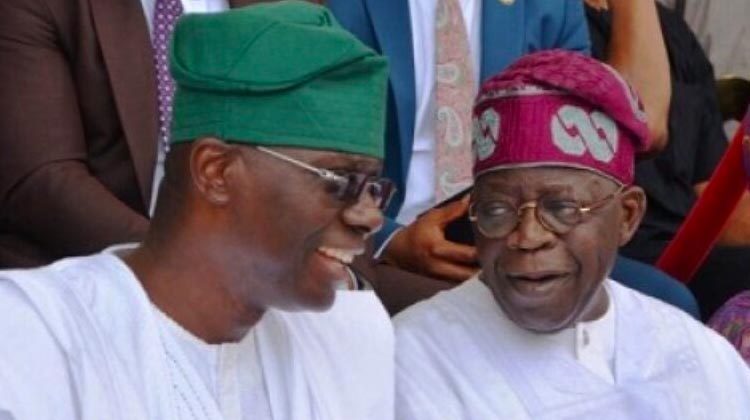By
Citizen Bolaji O. Akinyemi
What is coming in 2027 is nothing less than a war—unless we act now. History teaches us that Nigeria’s political crises often begin as quarrels between mentors and protégés. The Awolowo–Akintola rift ignited the “Wild Wild West,” and opportunists feasted on the chaos. Today, the storm gathers again, this time in Alimosho, the political nucleus of Lagos West, a senatorial district with ten of Lagos State’s twenty local governments.

ALIMOSHO’S PLACE IN TINUBU’S RISE
Alimosho became Bola Ahmed Tinubu’s home turf when he first contested the Lagos West senatorial seat during Babangida’s transition programme. By 1999, when Tinubu sought the governorship, he understood Alimosho’s decisive weight. With Rauf Aregbesola as his field marshal, he locked down the jugular of Alimosho politics. Even after Aregbesola was dispatched to Osun State, where he delivered his mentor’s mandate, the scars of their later fallout remain untested in Alimosho.
Now, the embers are being stoked again. A planned declaration by the ADC coalition on September 6th was billed to test those scars and showcase a rising opposition alliance. Instead, fear prevailed. Barely 24 hours to kickoff, police stormed and sealed Lion’s Field—Alimosho’s iconic political and sporting ground—under the vague excuse of “orders from above.”
“ORDERS FROM ABOVE”: WHICH ABOVE?
When the police say “orders from above,” who do they mean? The Commissioner of Police? The Inspector-General, Kayode Egbetokun? Or the Commander-in-Chief himself, Bola Ahmed Tinubu?
Lion’s Field is no ordinary space. It nurtured football stars like Peter Rufai and served as Aregbesola’s political fortress. To shut it down without due process is to trample not just on opposition politics but on the memory of a community’s cultural and democratic legacy.
And the echoes are chilling. Nigerians have heard “orders from above” before—at Lekki Toll Gate in October 2020. Victims of those “orders” lie in graves, 103 confirmed by leaked documents, but possibly many more.
DEMOCRACY ON POLICE BARRICADES
Nigeria’s constitution is clear: freedom of association and peaceful assembly are guaranteed. The Court of Appeal in IGP v. ANPP (2007) ruled that requiring police permits for rallies is unconstitutional. Section 137 of the Nigeria Police Act 2020 goes further, instructing officers not to obey unlawful orders and to report them.
Yet in Kaduna, the police disrupted an ADC convergence and invited Mallam Nasir El-Rufai and others for questioning. In Lagos, Lion’s Field was sealed the day before an ADC gathering. This is not about “security”; it is about fear. Fear of opposition coalitions. Fear of losing Lagos in 2027. Fear that democracy, if allowed to breathe, will sweep aside a failing establishment.
International law is no less explicit. ICCPR Article 21 and African Charter Article 11, domesticated in Nigeria and upheld in Abacha v. Fawehinmi (2000), affirm the right to peaceful assembly. By sealing Lion’s Field, the government flouts both its own laws and its treaty obligations.
THE CONSEQUENCES OF POLICE PARTISANSHIP
Weaponising the police for partisan control risks more than delegitimising elections. It delegitimises the police themselves. Once citizens view the Nigeria Police as the “Government Police Party,” the gulf between people and state security widens. History shows that when state policing collapses in credibility, people improvise. They form self-help structures. They birth “people’s police.” Such parallel authority is combustible—and once lit, even the state cannot contain it.
2027: THE COMING WAR
The signs are everywhere. In 2023, Lagosians shocked the establishment by voting against the “owners of Lagos.” The backlash was brutal: thugs, motor-park enforcers, and violence chased voters from polling units. Between presidential and governorship elections, threats became reality, blood was spilled, and the judiciary awarded mandates from the bench.
Now, in 2027, those same warlords are being positioned as councillors and mayors through compromised local government elections. By then, they will wield not just sticks but state-sanctioned authority. Violence is being formalised into governance. The words of Muhammadu Buhari echo ominously: “the monkey and the baboon will be soaked in blood.”
A CALL TO NIGERIANS AND THE WORLD
If Nigerians remain silent, if the international community looks away, we risk normalising authoritarian exceptionalism. We risk alienating our youth. We risk fuelling instability.
The world must know: Nigeria stands at a red line. Lion’s Field in Alimosho is not about a local squabble—it is a litmus test for whether democracy will survive in Africa’s most populous nation. The police must withdraw from partisanship and return to their constitutional role as protectors, not curators, of politics.
2027 does not have to be war. But unless Nigerians and friends of democracy worldwide rise now, speak now, and act now, we will walk into that war with eyes wide open.
BOLAJI O. AKINYEMI IS AN APOSTLE AND NATION BUILDER. HE’S ALSO PRESIDENT VOICE OF HIS WORD MINISTRIES AND CONVENER APOSTOLIC ROUND TABLE. BOT CHAIRMAN, PROJECT VICTORY CALL INITIATIVE, AKA PVC NAIJA. HE IS A STRATEGIC COMMUNICATOR AND THE C.E.O, MASTERBUILDER COMMUNICATIONS.
EMAIL:[email protected]
FACEBOOK:BOLAJI AKINYEMI.
X:BOLAJI O AKINYEMI
INSTAGRAM:BOLAJIOAKINYEMI
PHONE:+2348033041236


